Welcome To ChemAnalyst

Hamburg (Germany): In mid-June 2024, Germany's Polylactic Acid (PLA) market experienced a period of stability. PLA prices were recorded at USD 2,430 per metric ton (MT) on a CFR (Cost and Freight) Hamburg basis, marking a marginal increase of USD 10/MT, or 0.4%, from the previous week. This stability was supported by a balance between supply and demand, driven by consistent requirements from key industries and steady domestic production.
Demand for PLA remained robust, fueled by continuous consumption in packaging, 3D printing, and textiles. Seasonal variations, such as increased demand for cold beverage packaging during summer, had minimal impact on overall demand stability. On the supply side, domestic production facilities in Germany operated regularly, ensuring a steady flow of PLA. This was complemented by stable import volumes from neighboring countries such as the Netherlands, Belgium, and the USA, preventing any oversupply issues.
Balanced inventory levels at manufacturers and distributors further contributed to price stability. A notable 4.02% decrease in raw material costs, particularly for corn-based PLA feedstocks, helped maintain production expenses, exerting minimal pressure on final PLA prices.
In line with market stability, the European Union launched the MoeBIOS project in June 2024 to enhance waste management and upcycling of biobased plastics, including PLA. This initiative involves 21 partners across Europe and focuses on improving recycling processes for bioplastics used in packaging, textiles, and agriculture. Such initiatives underscore the industry's commitment to sustainability and innovation.
Despite recent increases in global shipping rates due to crises in the Red Sea and weather disruptions, Germany's PLA supply remained stable. Shipping rates from Asia to Europe saw double-digit increases, reminiscent of peaks during the pandemic, with notable year-on-year rises in freight costs to Rotterdam and Genoa. However, these challenges did not significantly disrupt the PLA supply chain in Germany.
Demand for PLA in Germany remained moderate and steady, supported by key downstream industries. While sectors like cold beverage packaging experienced seasonal fluctuations, other applications maintained stable year-round demand. Additionally, Euro area inflation was expected to be 2.6% in May 2024, slightly up from 2.4% in April, reflecting moderate economic growth.
The stability observed in Germany's PLA market in mid-June 2024 results from balanced supply and demand dynamics, supported by consistent domestic production and stable import volumes. The launch of the MoeBIOS project highlights the industry's focus on sustainability, potentially strengthening market stability in the long term.
Looking ahead, potential supply chain disruptions and recovery in key sectors like automotive and textiles are expected to influence PLA demand and pricing. Technological advancements and increased production capacities may mitigate upward price pressures, while environmental concerns could drive higher demand for biodegradable materials. Seasonal factors such as falling corn prices and decreased energy costs could lead to lower PLA production costs and potentially reduce prices in the coming months. Overall, the outlook for Germany's PLA market suggests continued stability with potential fluctuations driven by broader economic and environmental trends.
We use cookies to deliver the best possible experience on our website. To learn more, visit our Privacy Policy. By continuing to use this site or by closing this box, you consent to our use of cookies. More info.
